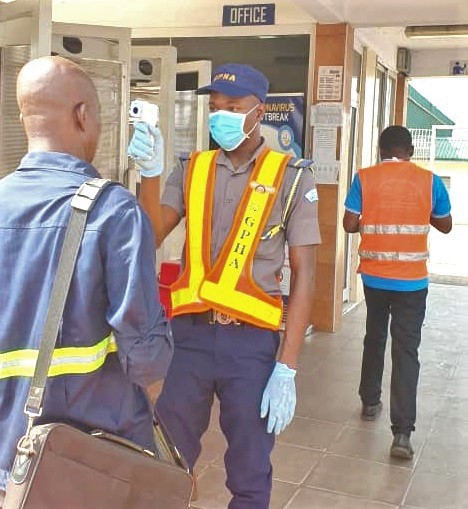
Coronavirus: Suspected case aboard shipping vessel negative
Preliminary test results from the Noguchi Memorial Institute Laboratory on a suspected case of COVID-19 reported aboard a container vessel, Maersk Cunene, which docked at the Tema Port last Friday has tested negative.
The vessel, with a carrying capacity of 4,496 Twenty Equivalent Units (TEU) and flying a Singaporean flag, came to the port anchorage on Friday, March 13, 2020, but had to be in self-quarantine after the captain was reported to have had a temperature of 38.8 degrees accompanied by fever, cough, sore throat and periodic sweating with shivers, general unwellness and headache - some of the symptoms of the viral disease.
The situation prompted an initial quarantine of the vessel on anchorage while samples were taken by medical officials from the GPHA Clinic and sent to Noguchi where the tests were said to have come out negative.
Port protocol
The General Manager in charge of Corporate Affairs and Marketing at the GPHA, Mrs Esther Gyebi-Donkor, in an interview with the Daily Graphic at the Tema Port, indicated that following the composition of an inter-organisational committee by the port authority, certain protocols had been put in place for the shipping lines to provide information on vessels calling at the port seven clear days ahead of their arrival at the anchorage.
The captain of the vessel, she said, had travelled by air from Edinburgh in Scotland via Heathrow Airport to Malaga in Spain prior to joining the vessel at the Algeciras Port, also in Spain on January 28, 2020.
Following the protocols put in place, the Maersk Cunene alerted the port officials to the condition of the captain, the general manager indicated.
Treated and discharged
Mrs Gyebi-Donkor further explained that a team of medical officers, led by the Head of Medical Services at GPHA in charge of health services as the Incident Commander, officials of Port Health, Immigration and the Ghana Navy went on board the vessel and screened the rest of the crew members.
The team, she said, found out that all other crew members had normal temperature and, therefore, did not require any form of testing.
She said following the receipt of the results from Noguchi at about 10 p.m. on Sunday, the vessel was given the go-ahead to dock at the MPS facility to discharge its cargo while the sick captain was treated “for the requisite non-contagious ailment”.
“The incident was successfully reported and managed under the authority’s Standard Operating Procedure (SOP) that has been in place since January,” Mrs Gyebi-Donkor emphasised.
New measures
The authority has since deployed screening devices at the various entrances of the port to screen all port users.
Educational materials had also been made available at the entrances of the various terminals when the Daily Graphic toured the facility last Monday.
Personnel were also seen in protective gears as they screened port users entering the facility.
Similar activities have been deployed at the MPS terminal where majority of the container movement activities take place.
Mrs Gyebi-Donkor stressed that the authority was up to the task and that all necessary protocols and protection mechanisms would be deployed to avoid an outbreak as the port was not oblivious of the threat the scourge posed to its business.
“We would like to use this opportunity to encourage all our stakeholders to understand that we are working against the fastest threat and it behoves all of us to fully cooperate so we can protect the health and economic interest of the nation,” she stressed.
Drop in cargo
Asked whether the pandemic had affected vessel calls and cargo at the port, Mrs Gyebi-Donkor explained that whereas the first quarter of the fiscal year was usually low in cargo traffic, March usually recorded an average peak as importers would usually bring in consignments they wished to trade during the Easter festivities.
“Following the spread of the disease, there has been some drastic reduction over the past weeks, particularly from Europe and Asia which are major trade routes for Ghanaian importers,” Mrs Gyebi-Donkor indicated.
